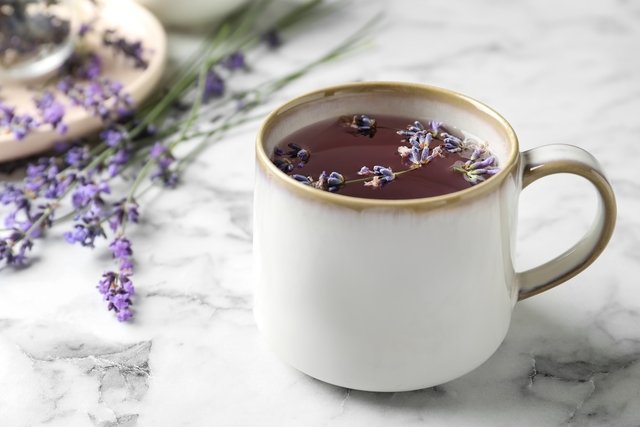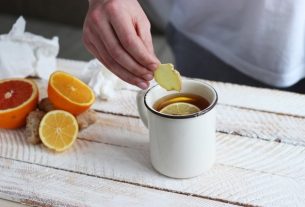Some headache teas, such as chamomile tea or peppermint tea, have essential oils with calming, analgesic or anti-inflammatory properties, making them a good home remedy option for headaches or migraines caused by stress. anxiety, or excessive consumption of stimulating drinks, such as coffee or black tea, for example.
In addition to teas, maintaining a healthy diet and getting a good night’s sleep are also some ways that help improve headaches. See other ways to relieve headaches without medication.
Teas or home remedies for headaches should not replace the use of medications prescribed by your doctor, but are only a complement to headache treatment. If the headache is very strong or frequent, it is important to consult a neurologist to evaluate the possible causes of the headache and prescribe the most appropriate treatment. Check out the main types of headache and what to do.
1. Lemon balm tea
Lemon balm tea can also relieve a headache, especially if it is caused by stress, because it helps relax muscles and release tension, which can contribute to headache relief. Learn more about the benefits of lemon balm tea.
Ingredients:
- 1 tablespoon of lemon balm leaves;
- 1 cup of boiling water.
Preparation mode:
Add the lemon balm leaves to the boiling water, cover and let it rest for a few minutes. Then, strain and drink 3 to 4 cups of this tea per day. See another lemon balm tea option to alleviate anxiety symptoms.
Care: Lemon balm tea should not be consumed by children under 12 years of age or people with hypothyroidism, low blood pressure, glaucoma or benign prostate hyperplasia.
People who use thyroid medication or sedatives should always talk to a doctor before consuming lemon balm tea. Furthermore, pregnant or breastfeeding women should consult their doctor before consuming this tea.
2. Chamomile tea
Chamomile tea is rich in apigenin, a substance that acts on brain receptors, causing a relaxing and calming effect, making it a good option for a home remedy for headaches caused by tension, anxiety or insomnia.
Furthermore, this tea also has analgesic and anti-inflammatory properties that help relieve headaches.
Ingredients:
- 1 teaspoon of fresh or dried chamomile flowers;
- 1 cup of boiling water.
Preparation mode:
Add the chamomile flowers to a cup of boiling water, cover and leave to infuse for 5 to 10 minutes. Afterwards, remove the flowers from the water. Leave to cool and then drink. You can drink the tea 2 to 3 times a day or as soon as the headache starts.
Care: Chamomile tea is not recommended for people allergic to chamomile and plants in the same family as chamomile, such as daisy, ragweed and chrysanthemums. Additionally, people who are using anticoagulants, sedatives, painkillers or other medications should speak to a doctor before drinking chamomile tea.
Chamomile tea (Matricaria recutita) can be used during pregnancy and breastfeeding. However, Roman chamomile tea is not recommended, as there are no studies that prove the safety of using this type of chamomile in these phases.
See the following video for other benefits of chamomile tea and learn how to prepare this tea:
3. Boldo tea
Boldo tea, prepared with dried Chilean boldo leaves or fresh Brazilian boldo leaves, is rich in boldine, rosmarinic acid and forskolin, with detoxifying properties, which help cleanse the liver and relieve headaches, especially caused by poor digestion or hangover.
Furthermore, boldo tea has a calming and relaxing effect, making it a good option for a home remedy for headaches.
Ingredients:
- 1 cup of water;
- 1 teaspoon of chopped fresh boldo leaves.
Preparation mode:
Bring 1 cup of water to boil and then turn off the heat. Add 1 spoon of boldo leaves. Cover, wait to cool, strain and sweeten to taste. This tea can be taken twice a day to relieve headache symptoms.
Care: boldo tea should not be used by people with liver diseases, such as hepatitis or liver cancer, or who have inflammation of the bile ducts. Furthermore, this tea should not be ingested by children, pregnant or breastfeeding women.
4. Laurel tea
Laurel tea has good amounts of eugenol, a phenolic compound with analgesic and anti-inflammatory properties that act on the nervous system, helping to relieve headaches.
In addition, bay leaves also contain linalool, a bioactive compound with a calming action that acts on the nervous system, promoting relaxation and improving headaches caused mainly by anxiety, stress or insomnia.
Ingredients:
- 2 dry bay leaves;
- 1 cup of water.
Preparation mode:
In a pan or kettle, add water and let it boil. Remove the pan, or kettle, from the heat, add the bay leaves, cover and let it rest for 10 minutes. Strain and drink up to 3 cups of this tea per day.
Care: This tea is not recommended for children, nor is it recommended for pregnant or breastfeeding women.
5. Oregano tea
Oregano tea has calming and anti-inflammatory properties due to the presence of carvacrol in its composition, a bioactive compound that helps relieve headaches. Discover all the properties of oregano tea.
Ingredients:
- 1 tablespoon of fresh or dried oregano leaves or flowers;
- 1 cup of boiling water.
Preparation mode:
Add the oregano to the cup of boiling water, cover and let it rest for 5 to 10 minutes. Strain, let cool and drink 2 to 3 times a day.
Care: Oregano tea is not recommended for pregnant or breastfeeding women. It is also not recommended for people allergic to plants in the Lamiaceae family, such as basil, lavender, marjoram, mint and sage.
6. Peppermint tea
Peppermint tea helps relieve headaches, as it is rich in substances such as menthol and menthone, with anti-inflammatory, analgesic and calming properties, which help relieve severe headaches.
In addition to tea, a massage with peppermint essential oil placed on the temples also helps to relieve tension and migraines.
Ingredients:
- 2 teaspoons of chopped fresh peppermint;
- 150 ml of water.
Preparation mode:
Place the peppermint leaves in a cup of boiling water, cover and let it rest for a few minutes. After cooling, strain the tea and drink it afterwards. You can drink 1 cup of tea 2 to 4 times a day. See other benefits and other recipes with mint.
Care: Peppermint is not recommended during pregnancy, breastfeeding, in cases of stomach inflammation, in the presence of gallstones or in serious liver diseases. The herb should also be avoided in children under 2 years of age.
7. Lavender tea
Lavender flower tea is a home remedy that can be used for headaches, especially when caused by tension or stress, due to its calming, relaxing and analgesic properties.
Ingredients:
- 30 g of chopped lavender flowers;
- 1 liter of water.
Preparation mode:
Bring the water to a boil and then add the lavender flowers and turn off the heat. Cover the pan and let it cool. Strain and drink.
Care: Lavender tea should not be consumed by pregnant women and children, as well as people who have a gastric ulcer.
8. Valerian tea
Valerian contains sesquiterpene compounds in its composition, such as valerenic and isovaleric acids, which help relieve headaches, as these compounds increase the activity of the GABA neurotransmitter in the brain, which has a sedative and tranquilizing action.
Ingredients:
- 1 to 3 g of dry valerian root;
- 1 cup of water.
Preparation mode:
Boil a cup of water and add the valerian root. Let it boil for 10 minutes. Turn off the heat and let it cool. Afterwards, strain and drink up to 3 cups a day.
Care: Despite the benefits of valerian, this tea should be avoided by pregnant and breastfeeding women and children under 12 years of age.
9. Ginger tea
Ginger tea contains gingerol, chogaol and zingerone, which are substances with anti-inflammatory and antioxidant properties, which help reduce inflammation that can cause pain, making it great for relieving headaches.
Additionally, this tea has antiemetic properties, which can help relieve nausea and vomiting that can occur when you have a severe headache or migraine. See other benefits of ginger tea.
Ingredients:
- 1 cm of ginger root, cut into slices or grated;
- 1 liter of boiling water.
Preparation mode:
Add the ginger to a pan with water and let it boil for 5 to 10 minutes. After cooling, strain and drink a maximum of 4 cups per day.
Care: Ginger tea should be avoided by people who use anticoagulants such as warfarin or acetylsalicylic acid, as it may increase the risk of bleeding or hemorrhage.
Furthermore, pregnant women should not use more than 1 g of ginger per day, and it is recommended to drink the tea for a maximum of 3 days in a row.
This tea should also not be used close to childbirth or by women with a history of miscarriage, clotting problems or who are at increased risk of bleeding.
10. White willow tea
White willow tea, prepared with the medicinal plant Salix albais rich in salicin, a substance similar to the main ingredient in aspirin, with analgesic and anti-inflammatory properties, which help relieve headaches.
Ingredients:
- 1 teaspoon of dried and chopped willow bark;
- 1 cup of water.
Preparation mode:
Bring the water to a boil and add the willow bark. Let it boil for 10 minutes, strain, wait for it to cool and drink up to 2 cups a day.
Care: This tea should not be consumed by children, pregnant or breastfeeding women, people who are allergic to aspirin or who are using anticoagulants. Furthermore, the use of white willow bark tea is not recommended for people with gastrointestinal problems, such as ulcers, gastritis, gastroesophageal reflux, colitis or diverticulitis.
11. Turmeric tea
Turmeric tea, also called saffron, is rich in curcumin, a substance with powerful anti-inflammatory properties, making it a great option for a home remedy for headaches.
Ingredients:
- 1 level teaspoon of turmeric powder (200 mg);
- 1 cup of water.
Preparation mode:
Put the water to boil and add turmeric. Let it boil for 5 to 10 minutes. Strain the tea and drink 2 to 3 cups of turmeric tea a day.
Another option is to consume turmeric in capsule form, which can be used by taking 2 250 mg capsules every 12 hours, totaling 1 g per day.
Care: This tea or turmeric capsules should not be used by people taking blood thinners, such as warfarin, clopidogrel or acetylsalicylic acid, as it may increase the risk of bleeding or haemorrhage.
12. Tansy tea
Tansy tea, prepared with the medicinal plant Parthenium tanacetumis rich in substances such as flavonoids, sesquiterpenes and volatile oils, with powerful analgesic and anti-inflammatory action, which help to relieve severe headaches or migraines.
Ingredients:
- 15 g of tansy aerial parts;
- 600 mL of water.
Preparation mode:
Bring the water to a boil and then remove it from the heat and add the plant, cover and let it rest for about 10 minutes. Drink a cup of this tea 3 times a day.
Care: Tansy tea should not be used during pregnancy and lactation, or by people taking anticoagulant medications.

Sign up for our newsletter and stay up to date with exclusive news
that can transform your routine!
Warning: Undefined array key "title" in /home/storelat/public_html/wp-content/plugins/link-whisper-premium/templates/frontend/related-posts.php on line 12
Warning: Undefined array key "title_tag" in /home/storelat/public_html/wp-content/plugins/link-whisper-premium/templates/frontend/related-posts.php on line 13




